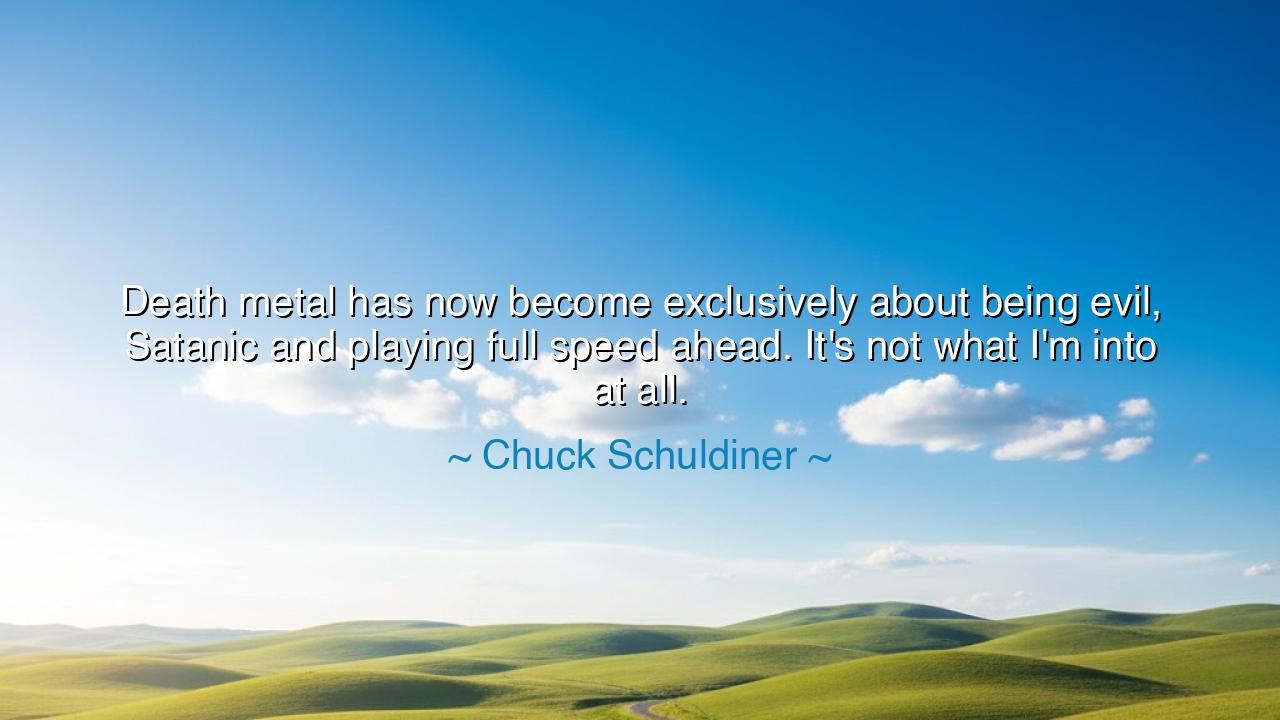
Death metal has now become exclusively about being evil, Satanic
Death metal has now become exclusively about being evil, Satanic and playing full speed ahead. It's not what I'm into at all.






“Death metal has now become exclusively about being evil, Satanic and playing full speed ahead. It's not what I'm into at all.” Thus spoke Chuck Schuldiner, founder of the band Death and the father of an entire musical movement. Yet beneath his words, there is more than a musician’s opinion — there lies the lament of an artist misunderstood, a prophet watching his creation drift away from its original spirit. In this declaration, Schuldiner is not merely speaking of music; he speaks of purity, of purpose, and of the eternal struggle between creation and corruption. He reminds us that when art loses its soul — when it becomes only noise, only anger, only performance — it ceases to be art at all.
The origin of this quote is found in Schuldiner’s later reflections on the genre he helped create. In the 1980s, he birthed death metal — not as a hymn to darkness, but as a vessel for human truth. His vision was to use sound as a mirror for life’s intensity, its pain, and its triumph. But as the years passed, he saw his vision hardened into imitation. Bands began to glorify evil for its own sake, to worship speed over substance, aggression over artistry. What began as a form of expression became a caricature of itself — a theater of noise without meaning. Schuldiner’s words were the cry of an artist yearning to bring back depth, emotion, and thought to a realm consumed by excess.
To say, “It’s not what I’m into at all,” is not rejection — it is rebellion in the truest sense. Schuldiner’s rebellion was not against others, but against emptiness. He sought music that spoke of struggle and spirit, not merely of shock. For him, evil and Satanism were symbols that had lost their meaning, drained of power through repetition. He wanted instead to write of life — its questions, its fears, its courage. His later albums, like Symbolic and The Sound of Perseverance, became hymns of introspection, turning the raw aggression of metal into a kind of philosophy. Through his guitar, he did not seek to summon darkness, but to reveal the human condition — the endless war between despair and transcendence.
This struggle between the sacred and the superficial is as old as art itself. The ancients knew it well. When the great sculptors of Greece carved their gods, they did not carve to worship marble, but to awaken the divine within man. Yet, over time, their successors imitated form without understanding spirit — until the craft became lifeless. So it was in Schuldiner’s time. His art was born from the soul, but others saw only the surface — the growl, the speed, the fury. They took his creation and stripped it of its truth, mistaking volume for power, imitation for reverence. But Schuldiner, like the true artists of old, knew that art must evolve, not decay. He sought not louder music, but truer sound.
There is a story of Beethoven, deaf and weary, who continued to compose even when he could no longer hear. What he wrote then — the Ninth Symphony — was not made for the ear, but for the spirit. His genius was not in sound alone, but in meaning. So too with Schuldiner. He once said, “I don’t think about the word ‘metal.’ I think about the music.” In that statement, as in this quote, he reveals a deeper wisdom: that labels are cages, and that the artist’s duty is not to belong, but to be. When genres harden into dogma, they suffocate their own life. The true creator must break through them, even at the cost of being misunderstood.
Thus, Schuldiner’s words are not merely criticism; they are a call to integrity. Whether one paints, writes, sings, or lives — the message is the same: do not serve form over truth. Do not mistake the outer ritual for the inner flame. The world will always tempt you to conform, to imitate, to become what sells rather than what matters. But art — and life itself — demand authenticity. The one who dares to walk alone, guided not by applause but by conviction, becomes a beacon to others lost in noise. Schuldiner’s defiance, like that of the ancient thinkers and mystics, was born of faith — faith that beauty and sincerity still matter in a world that glorifies chaos.
The lesson, then, is timeless and universal: guard the spirit of your craft. Whether your art is music, word, or action, do not let it become hollow imitation. Seek always the truth that moves beneath the surface. Let your work be a reflection of your soul, not a shadow of another’s. If the world becomes obsessed with speed and spectacle, slow down and listen. If others chase darkness for attention, shine a light.
For as Chuck Schuldiner teaches us, art without meaning is noise, and life without purpose is the same. The wise and the brave must create not to impress, but to express — not to be evil, but to be real. Let the world play fast and loud if it must; your task is to play true. For in truth lies the only music that endures — the song that neither death nor fashion can silence.






AAdministratorAdministrator
Welcome, honored guests. Please leave a comment, we will respond soon